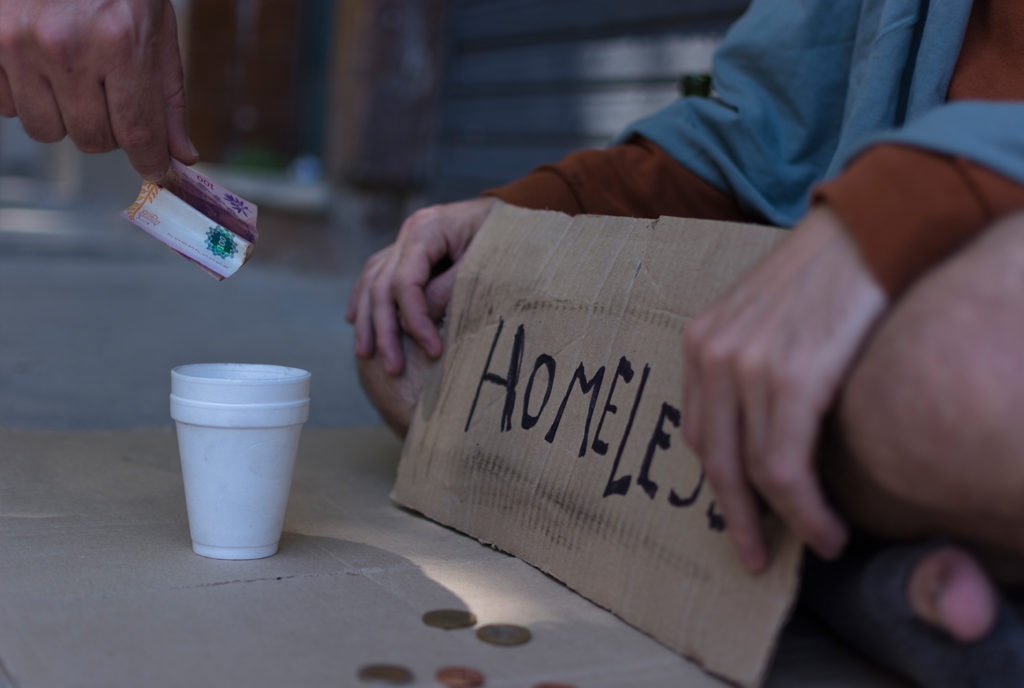
How Covid-19 is forcing policymakers to tackle homelessness
The coronavirus is serving as an equalizer by revealing the broken parts of developed countries writes Ayilah Chaudhary.
The latest shelter-in-home/stay-at-home mandates have fundamentally changed the lives of much of the world’s population by containing people in their homes. Yet the situation for people experiencing homelessness is uniquely vulnerable – lacking proper shelter, sanitation and healthcare, the peak rate of COVID-19 infection among the unhoused is 40 percent, according to data compiled by researchers at University of Pennsylvania, UCLA, and Boston University.
Ever since the start of the worldwide outbreak, policymakers and advocates warned of the factors that place homeless people at far more risk than the rest of the population. Not only do homeless people often have untreated mental health issues and underlying medical conditions, but a considerable amount routinely abuse drugs and alcohol. Compounded with chronic stress, this weakens their immune systems while increasing the rampancy of conditions that worsen the virus’ symptoms, such as lung disease. To make matters worse, in the United States homelessness disproportionately affects people of colour, and shelters that are spacious enough to permit social distancing are virtually nonexistent.
Ironically, the shelter-in-home mandates are inapplicable to the unsheltered, who often sleep on streets or in crowded tent encampments. The dire consequences of COVID-19 on the homeless have not gone unnoticed by local and state governments; some governments are subsidizing temporary housing costs, while others are resisting pleas to allocate funds.
“Please consider the morality of those decisions. Consider the moment we’re in and the ethical question you’re being called and asked upon. Consider your station in life and in history. All of us will be judged,” said Gavin Newsom, Governor of California, when announcing the state’s “Project Roomkey,” an initiative in which the government will pay 75% of costs associated with housing certain homeless people. On any given day prior to COVID-19, upwards of 150,000 people were experiencing homelessness in California.
Similar solutions were enacted across the world, particularly in major cities where homelessness is pervasive. In mid-March, London Mayor Sadiq Khan’s office provided 300 rooms to vulnerable homeless people and began working with hotels to block-book rooms at a discounted rate for the coming months. In New York City, Mayor Bill de Blasio announced at a press conference that 6,000 homeless individuals would be relocated into empty hotel rooms.
Though sleeping bags and tents still dot the streets of these major cities, governments have even begun enforcing restrictions to prevent surges in homelessness. Predicting that the coronavirus-induced recession could leave many without jobs and with missed rent checks, certain cities are banning evictions or offering rental voucher money.
In doing so, policymakers and advocates have begun to conquer homelessness, which was previously thought to be either impossible, inevitable, or both. But urban homelessness was a crisis well before the spread of coronavirus, and some have argued that the pandemic would simply replace the current homeless population with another post-recession tidal wave of rough sleepers.
But after the failed attempts of activists pushing for quality-of-life laws to protect those on the streets, what has suddenly motivated governments to treat homelessness as a public health priority? In a matter of weeks, the people huddled in hallways or camping in metro station corners are now being offered temporary housing at scale.
Up until now, homelessness was seen as both a sociopolitical inevitability or a human rights issue unacceptable in purportedly progressive countries. The unacceptable was tolerated, and arguably enabled by certain economic conditions, until the indiscriminate COVID-19 showed how it could threaten the livelihood of the remainder of the society. Then, homelessness evolved from a human rights issue to a public health issue, and solutions, however short-term, were enacted with little delay.
In a certain sense, the pandemic has forced the government to consider protections for vulnerable populations that otherwise would not be at the forefront of the conversation. The contagious and indiscriminate nature of COVID-19 serves as an equalizer by revealing the broken parts of seemingly developed countries. Minimum wage workers in fast-food and grocery stores are often uninsured and underpaid, but are performing crucial tasks at this uncertain time. As Newsom emphasizes, COVID-19 can and will show the morality of society’s decisions in this point in history. When the pandemic subsides, will governments allow working classes, who many currently regard as first responders, remain uninsured? Will homeless people continue to be perceived as a tolerable inevitability and be expected to return to the streets, even after their vulnerabilities have been brought to light?
Ayilah Chaudhary is a journalist based in California, who has written in the past for Al Jazeera, USA Today and other respected outlets

